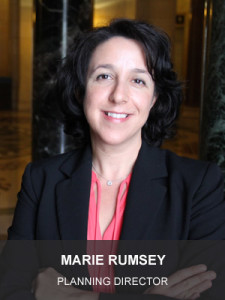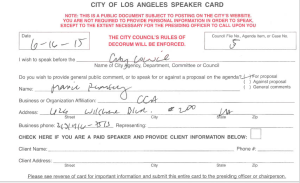
I submitted evidence of three violations, although there were clearly many others. They tagged her for two of them. She admitted that she’d broken the law, but gave as an exceedingly lame excuse that… well, let the CEC tell it:
Rumsey received inaccurate legal advice from CCA’s former legal counsel and mistakenly believed that she could attempt to influence any City agency except Councilmember O’Farrell’s office.
Because of this and because of her cooperation, CEC staff is recommending leniency:
The maximum administrative penalty for a violation of the City’s post-employment laws is the greater of $5,000 or three times the amount of compensation that was improperly received. Los Angeles City Charter § 706(c)(3). In this case, the two counts against Rumsey result in a maximum penalty of $14,250. We recommend a penalty of $7,125, which is equal to 50 percent of the maximum in this case. We believe the recommended penalty is appropriate, because it takes into consideration the serious nature of the violations while also encouraging cooperation with Ethics Commission investigations and the early resolution of violations.
These offers of 50% of the fine seem to be standard for people who cooperate with the CEC. And the $7,125 isn’t pocket change, even if the CCA ends up paying it for her.1 In this case, though, I think such a low offer is a mistake, not least because on analysis her excuse turns out to be unsupportable. For details on this, and some other interesting matters regarding this case, read on!
See, Marie Rumsey claims that the CCA’s former2 lawyer told her that she could lobby any City agency but “Councilmember O’Farrell’s Office.” There are so many problems with this excuse! First of all, take another look at the law:
C. The following time-based restrictions on lobbying activities apply to former City officials.
1. For one year after leaving City service, a City official shall not receive compensation to attempt to influence, either personally or through an agent, City action on any matter pending before any agency on behalf of a person other than an agency if, during the 24 months preceding the official’s departure from City service, the official held any of the following positions: elected City officer; Board of Public Works Commissioner; General Manager; Chief Administrative Officer; Mayor’s Chief of Staff; Deputy Mayor; Mayoral Aide VII; Mayoral Aide VIII; Executive Assistant City Attorney; Chief Assistant City Attorney; Senior Assistant City Attorney; City Attorney Exempt Employee; Chief Deputy Controller; Administrative Deputy Controller; Principal Deputy Controller; Council Aide VI; or Council Aide VII.
2. For one year after leaving City service, all other former City officials shall not receive compensation to attempt to influence, either personally or through an agent, City action on any matter pending before an agency in which the City official served during the 24 months preceding the official’s departure from City service on behalf of a person other than an agency. Serving an agency means being directly employed by or being assigned or on loan to that agency.
Note that it’s the first section, LAMC 49.5.13.C.1, that she violated. It is the second section that CCA’s former attorney putatively told her she was bound to abide by. Are we really to believe that this probably imaginary former attorney skipped over the first paragraph3 on his way to the second paragraph? It’s not like these two restrictions are far apart in the Muni Code. They’re adjacent and the lawyer saw the second. How then could he plausibly have failed to see the first? And I do understand that these laws aren’t so easy to read. They make my head spin, actually. But I managed to figure them out to an extent sufficient to file a successful complaint with the CEC and I’m just an amateur. Are we really meant to believe that the CCA managed to hire a professional lawyer who couldn’t understand them? It seems far more likely that the former lawyer is falling on his sword to protect his former client.

Although the proposed stipulation doesn’t specify the dates of Rumsey’s violations, it does mention that they occurred during June and July 2015 and that they included lobbying with respect to homeless issues. As you can see from the speaker card that appears somewhere near this sentence, one of these issues had to do with revisions of LAMC 56.11, which are filed in Council File 14-1656. That Rumsey spoke before the Council on this issue on June 16, 2015 seems likely.5 And yet take a look at the Council minutes for that day. See how Item 5 was adopted by a vote of 13 to 1 with LaBonge absent.6
Thus whether she actually spoke or not, Rumsey went to City Council on June 16, 2015 with every intention of speaking before Mitch O’Farrell who was both present and voting on this motion. What then of the advice she claims she was given by her former CCA attorney? Why did she go to speak to Mitch O’Farrell and his colleagues on this issue if she was cognizant of any restrictions on her whatsoever?
And finally, consider the fact that the Ethics Commission trains everyone who’s subject to municipal ethics laws regarding their obligations. They train City employees at least every two years. So not only was Marie Rumsey trained multiple times about these matters, but all the employees of all the various City agencies that she lobbied in 2015 were trained as well. That means she was illegally lobbying for all of 2015 and not one of the people she lobbied said anything at all about it. Why, I really wonder, was I the only one to say anything? I can’t possibly, given the extensive training in ethics that they all receive, have been the only one to have noticed.
All of these issues degrade the plausibility of her excuse to some extent, do they not? Well, the Commission doesn’t have to follow its staff’s recommendation to accept the stipulation. In fact, they have the power to reject it and put the matter before an administrative law judge for a full hearing. And maybe they will!
- Interestingly, these fines get paid into the City’s general fund. In other words, my investigation, based on my CPRA requests, just earned $7,125 for the City of Los Angeles. I hope they’ll remember that next time they start bitching and moaning about how much my requests cost them in staff time. Low level Council aides seem to make about $1,000 per week, which, given their hours, is probably around $20 per hour. That is, I’ve essentially bought the City more than 350 hours of staff time in which to work on my CPRA requests. But will they thank me? Experience suggests that they will not.
- At least he’s former, right?
- Or, implausibly, couldn’t see that it applied to her.
- For the sake of argument only.
- Although it’s not a sure thing. See how it’s listed on the agenda as already having had a public hearing? And that means, at least according to our City Attorney’s probably-unconstitutional take on the Brown Act, that the Council is not required to hear comments. And I can’t find any comments on the video of the meeting, although that’s not dispositive, because it’s more than five hours long. And more than 20 people filled out speaker cards for that issue on that day, many of them professional activists on both sides of the issue. There seems to be very little chance that all of them were confused.
- Strangely, this is one of the few items passed by Council in 2015, or any other year for that matter, which wasn’t passed unanimously. Gil Cedillo voted against it.
